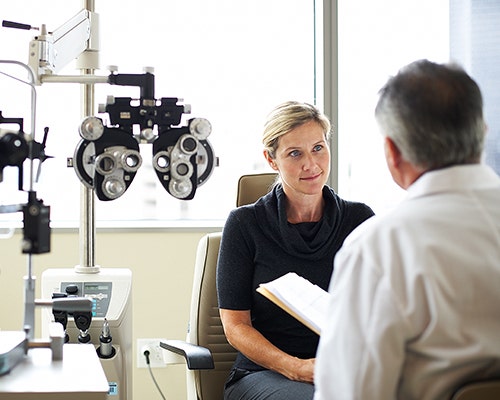Are Your Daily Habits Hurting Your Eyes?
- 1/11/17

The eyes are one of the most invaluable assets of the body, and it makes sense to do as much as possible to protect them. Yet, either by habit or circumstance, we often neglect to properly care for them or partake in activities that can cause the eyes harm. From minimizing eye strain caused by the computer to donning sunglasses whenever outdoors, there are many ways to help promote healthy eyes and vision.
Advice for eye health has often been passed down through generations. One of the most popular phrases of wisdom has been to avoid reading in low light because it can “ruin the eyes”. This has actually been partially disproven by Harvard Health. While doing so will not actually worsen vision, it can still tire the eyes more quickly and should be avoided. Positioning reading light directly onto the page, rather than over the shoulder, is the best choice for reading to avoid eye strain.
With today’s technology, more and more people are reading off luminescent computer screens, smartphones and tablets–not paper. To avoid headaches, eye fatigue and dryness from looking continuously at the screen, the American Academy of Ophthalmology recommends using the 20-20-20 rule. To follow, simply gaze away every 20 minutes at something 20 feet away for 20 seconds.
Basic common sense also goes a long way in protecting the eyes. The American Academy of Ophthalmology reported recently that almost half of all eye injuries occur in or around the home during improvement projects, as a result of not wearing safety goggles or glasses. It should also go without saying that cleanliness should be taken into account to avoid eye contamination with germs, dirt, and bacteria. Before touching the eyes or handling contact lenses, always wash hands thoroughly.
Most people know to eat their carrots, which are known for promoting eye health and protecting vision, thanks to high beta-carotene content. Dark greens like spinach or kale are also great choices for healthy vision, according to The National Eye Institute. Omega-3 fatty acids, found in supplements as well as fish like salmon and tuna, also help promote eye health. Lutein is another popular supplement known as “the eye vitamin”, according to WebMD. Lutein can also be found in broccoli, leafy greens, corn, kiwi, grapes, orange juice, zucchini and squash.
While many people may know what foods are wise to eat for healthy eyes, many may not be aware that a regular cocktail or wine habit can counteract all the goodness of eating sight-promoting foods. A new study led by Dr. Teenan, a fellow of the Royal College of Ophthalmologists and UK Medical Director, found that heavy drinking can seriously impact eye health, including the formation of cataracts and early onset of age-related macular degeneration. Smoking is another bad habit to quit, as it increases the risk of several eye disorders, says the CDC.
Swapping a drink or a cigarette for a workout session is a better way to de-stress that can also have positive benefits for the eyes. The results of a study of 4,000 participants, published in the British Journal of Ophthalmology, suggests that regular exercise can reduce the risk of age-related macular degeneration by up to 70%. Since healthy blood circulation and oxygen levels promote eye health, regular exercise helps to encourage both.
Exercise also helps support healthy weight management. Obesity is often a precursor to diabetes, which can lead to diabetic retinopathy, a very serious condition which is a leading cause of blindness in adults, according to MedlinePlus. Other diabetes-related eye complications include glaucoma and cataracts. Although early treatment and detection can save vision, 61 percent of Americans with diabetes don’t have an annual eye exam, according to a recent survey by the American Academy of Ophthalmology.
While people with diabetes are at an increased risk for eye problems, it is important for all adults 20 and older to have an eye exam once every two years. Seniors 65 and up should be checked annually, along with anyone requiring vision correction, according to the American Academy of Ophthalmology. The American Optometric Association recommends that children should have eye exams at age 3, again before they enter the first grade, and every two years thereafter if they do not show any signs of problems. Eye exams may seem unnecessary when the eyes “feel fine” and vision appears to be clear, but underlying conditions may not show symptoms immediately. It is also important not to disregard seemingly minor irritations like redness, which may be a sign of other eye issues which should be addressed.
Advice for eye health has often been passed down through generations. One of the most popular phrases of wisdom has been to avoid reading in low light because it can “ruin the eyes”. This has actually been partially disproven by Harvard Health. While doing so will not actually worsen vision, it can still tire the eyes more quickly and should be avoided. Positioning reading light directly onto the page, rather than over the shoulder, is the best choice for reading to avoid eye strain.
With today’s technology, more and more people are reading off luminescent computer screens, smartphones and tablets–not paper. To avoid headaches, eye fatigue and dryness from looking continuously at the screen, the American Academy of Ophthalmology recommends using the 20-20-20 rule. To follow, simply gaze away every 20 minutes at something 20 feet away for 20 seconds.
Basic common sense also goes a long way in protecting the eyes. The American Academy of Ophthalmology reported recently that almost half of all eye injuries occur in or around the home during improvement projects, as a result of not wearing safety goggles or glasses. It should also go without saying that cleanliness should be taken into account to avoid eye contamination with germs, dirt, and bacteria. Before touching the eyes or handling contact lenses, always wash hands thoroughly.
Most people know to eat their carrots, which are known for promoting eye health and protecting vision, thanks to high beta-carotene content. Dark greens like spinach or kale are also great choices for healthy vision, according to The National Eye Institute. Omega-3 fatty acids, found in supplements as well as fish like salmon and tuna, also help promote eye health. Lutein is another popular supplement known as “the eye vitamin”, according to WebMD. Lutein can also be found in broccoli, leafy greens, corn, kiwi, grapes, orange juice, zucchini and squash.
While many people may know what foods are wise to eat for healthy eyes, many may not be aware that a regular cocktail or wine habit can counteract all the goodness of eating sight-promoting foods. A new study led by Dr. Teenan, a fellow of the Royal College of Ophthalmologists and UK Medical Director, found that heavy drinking can seriously impact eye health, including the formation of cataracts and early onset of age-related macular degeneration. Smoking is another bad habit to quit, as it increases the risk of several eye disorders, says the CDC.
Swapping a drink or a cigarette for a workout session is a better way to de-stress that can also have positive benefits for the eyes. The results of a study of 4,000 participants, published in the British Journal of Ophthalmology, suggests that regular exercise can reduce the risk of age-related macular degeneration by up to 70%. Since healthy blood circulation and oxygen levels promote eye health, regular exercise helps to encourage both.
Exercise also helps support healthy weight management. Obesity is often a precursor to diabetes, which can lead to diabetic retinopathy, a very serious condition which is a leading cause of blindness in adults, according to MedlinePlus. Other diabetes-related eye complications include glaucoma and cataracts. Although early treatment and detection can save vision, 61 percent of Americans with diabetes don’t have an annual eye exam, according to a recent survey by the American Academy of Ophthalmology.
While people with diabetes are at an increased risk for eye problems, it is important for all adults 20 and older to have an eye exam once every two years. Seniors 65 and up should be checked annually, along with anyone requiring vision correction, according to the American Academy of Ophthalmology. The American Optometric Association recommends that children should have eye exams at age 3, again before they enter the first grade, and every two years thereafter if they do not show any signs of problems. Eye exams may seem unnecessary when the eyes “feel fine” and vision appears to be clear, but underlying conditions may not show symptoms immediately. It is also important not to disregard seemingly minor irritations like redness, which may be a sign of other eye issues which should be addressed.





